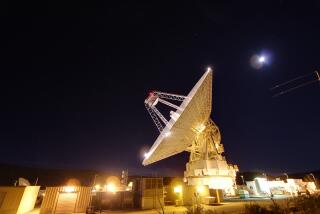U.S. Team Finds Russian Space Port Needs $100-Million Upgrade
- Share via
WASHINGTON — Russia’s space facilities in Kazakhstan appear adequate to support the Clinton Administration’s plan for a joint Russian-American space station program, but the United States may have to invest $100 million for various improvements, Rep. George E. Brown Jr. (D-Colton) said Tuesday.
Brown, chairman of the House Space Science and Technology Committee, and a team of space experts from his committee toured the Baikonur Cosmodrome last week. They were the first high-level U.S. delegation to make an on-site inspection of the facilities that Russia would use to launch key elements of the joint station.
Although the space technology that Russia would bring to the program is up to U.S. standards, much of the supporting facilities would not be adequate, said Brown, a leading space station proponent whose support is vital to its future. Committee staff members, for example, found that very few of the Baikonur buildings were even heated.
Brown expressed misgivings about the joint station, saying that the Clinton Administration “has moved precipitously into an engagement that we don’t fully understand.”
But at the same time, any further redesigns or restructurings of the politically fragile space station program--including loss of Russian participation--almost certainly would lead Congress to end funding, Brown said. Congress came within one vote earlier this year of killing the $30-billion program before announcement of the Russian agreement.
The pact calls on the United States to provide Russia with $400 million to launch parts of the station and to build various segments, including its propulsion system. All details of the agreement have not been worked out.
Another key concern is political friction between Russia and Kazakhstan over the Baikonur facility, which was built by Russia but is located in Kazakhstan, which formed an independent republic when the Soviet Union dissolved. Kazakhstan wants greater involvement in the program and is seeking compensation from Russia for use of the space port.
The Russian election this week, in which nationalists who oppose reforms of the Russian economy won substantial seats in Parliament, only further adds to the instability that threatens the program, Brown said.
Under the Clinton Administration plan, U.S. space workers would be stationed in Kazakhstan, which lacks modern housing and shopping facilities that American engineers and scientists are likely to expect.
Brown also expressed serious concern about attempting to build the space station at the same time the National Aeronautics and Space Administration budget is being cut 10% annually. Brown said that he would refuse to support the station unless NASA is adequately funded, though he said the White House recognizes his concerns.
More to Read
Sign up for Essential California
The most important California stories and recommendations in your inbox every morning.
You may occasionally receive promotional content from the Los Angeles Times.











